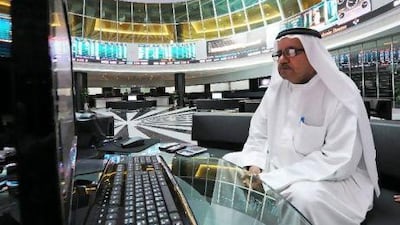Government finances from Italy to India are likely to come under severe strain from slower global economic growth.
Financial Fallout: Read The National's coverage of the global economic chaos
World view bleak but picture looks brighter in the Middle East Declines in markets are raising the likelihood of another global slowdown. If the world does lurch back into recession, economists say the MIddle East is in a better position to weather the economic storm. read article
Local tourism and retail at some risk Consumer spending is expected to remain buoyant across the Middle East should there be another economic slowdown across the world. Read article
UAE banks proactive on mortgages UAE lenders are starting to aggressively target homebuyers for the first time since US mortgage defaults sparked the 2008 global meltdown. read article
Asia may put GCC on slippery slope An economic slowdown threatens fuel demand, but Opec is likely to act if oil prices far too fall. read article
Small businesses can take shelter With the threat of a second global downturn looming large, both small businesses and investors have a lot to lose. read article
Already bogged down by record budget deficits and weak economies, the governments of the US and Europe are likely to be most vulnerable. In contrast, the Gulf and Asia should cope better, supported by healthier fiscal positions.
The biggest risk is from lower demand for oil, sinking prices. Of the six GCC states, Bahrain's small economy is viewed by analysts as most at risk to a market slide.
"Regional governments will still be willing to spend if oil prices drop as they have low debt compared to the rest of the world so they can borrow at low interest rates to fund spending," says Said Hirsh, a Middle East economist at Capital Economics.
In Asia, a fall in commodity prices and a drop in interest rates should help to support economies.
Slowing growth could harm the banking system. Banks in the US and Europe will be concerned about their exposure to debt worries on both sides of the Atlantic.
An uncertain economic outlook is likely to deter mergers and acquisitions and other lucrative deals that global investment banks rely on.
In the local region, however, most banks' balance sheets are considered sufficiently robust to withstand any risks from weaker economic growth. Many have stronger capital adequacy levels than lenders in the US and Europe. They also have relatively limited ties to European banks with links to the euro-zone sovereign debt crisis.
The US Federal Reserve's decision last week to keep interest rates at record lows for another two years is likely to mean interest rates in the GCC remain deflated. With five of the six local currencies pegged to the US dollar, regional monetary policy usually mirrors the Fed's.
"Low interest rates are positive for real estate, as lending rates should continue coming down, reducing the cost of risk as well," says Jaap Meijer,the head of banks research at AlembicHC.
Meanwhile, investors will be viewing markets differently over the next two quarters, says Mohammed Ali Yasin, the chief investment officer at CAPM Investment in Abu Dhabi. "They will be looking at economies with a surplus … with companies that distribute strong dividend yields, and based on that we should see a different asset allocation across the world."

